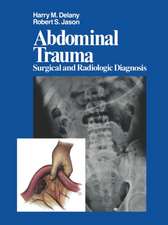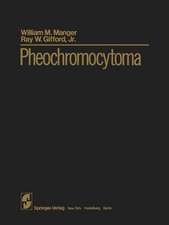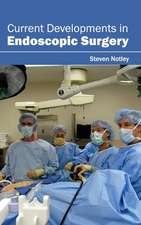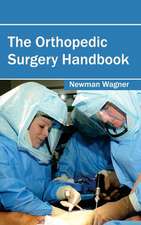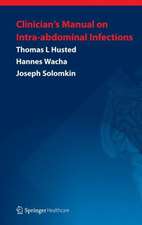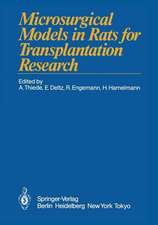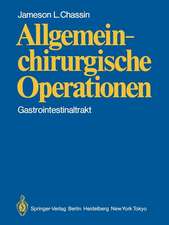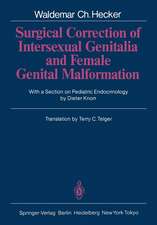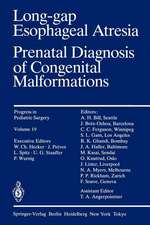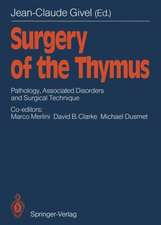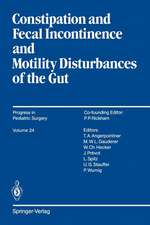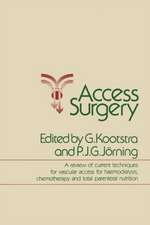Benign Tumors of the Liver
Editat de Luca Aldrighetti, Francesco Cetta, Gianfranco Ferlaen Limba Engleză Hardback – 6 mai 2015
Preț: 725.96 lei
Preț vechi: 764.17 lei
-5% Nou
Puncte Express: 1089
Preț estimativ în valută:
138.92€ • 148.55$ • 115.82£
138.92€ • 148.55$ • 115.82£
Carte tipărită la comandă
Livrare economică 17 aprilie-01 mai
Preluare comenzi: 021 569.72.76
Specificații
ISBN-13: 9783319129846
ISBN-10: 3319129848
Pagini: 337
Ilustrații: XVI, 337 p. 110 illus., 57 illus. in color.
Dimensiuni: 155 x 235 x 20 mm
Greutate: 0.67 kg
Ediția:2015
Editura: Springer International Publishing
Colecția Springer
Locul publicării:Cham, Switzerland
ISBN-10: 3319129848
Pagini: 337
Ilustrații: XVI, 337 p. 110 illus., 57 illus. in color.
Dimensiuni: 155 x 235 x 20 mm
Greutate: 0.67 kg
Ediția:2015
Editura: Springer International Publishing
Colecția Springer
Locul publicării:Cham, Switzerland
Public țintă
Professional/practitionerCuprins
Foreword.- Preface.- Part I: General Perspective.- 1. Epidemiology and Histopathology of Benign Liver Tumors.- 2. Molecular Biology and Genetics of Benign Liver Tumors.- 3. Genetic Syndromes and Benign Liver Tumors (Multiple Adenomas in Glycogen Storage Disease).- 4. Liver Physiopathology (Ischemia/Reperfusion, Factors affecting Liver Regeneration).- Part II: Imaging.- 5. Imaging Techniques (Ultrasound, CT, MR) of Benign Liver Tumors.- 6. Imaging Morphology in Benign Liver Tumors.- 7. Differential Diagnosis of Benign Liver Tumors.- Part III: Systematic Review of Benign Liver Tumors.- 8. Cysts and Polycystic Liver Disease.- 9. Caroli's Disease: Cystic Bile Duct Dilatations.- 10.Hepatolithiasis.- 11. Hemangiomas.- 12. Focal Nodular Hyperplasia.- 13. Hepatocellular Adenoma.- 14. Adenoma and Biliary Cystadenoma.- 15.Benign Tumors of Bile Ducts and Gallbladder.- 16. Liver Focal Localizations of Systemic Diseases.- 17. Focal Infectious Diseases.- Part IV: Treatment of Benign Liver Tumors.- 18. Transplantation for Benign Liver Lesions.- 19. Laparoscopic Liver Surgery in Benign Liver Lesions.- 20. Robotic Liver Resection for Benign Tumors.- 21. Interventional Radiology in Benign Liver Tumors: Embolization and Ablation.- 22. Intraoperative Ultrasound in Liver Surgery for Benign Tumors.- 23. Anesthesia and Intraoperative Management in Liver Surgery.- 24. Blood and Transfusion Management in Benign Liver Tumors.- 25. Fast Track Programs in Benign Liver Tumors.
Recenzii
“The authors should be commended for their meticulous literature search and the efforts made to include the latest information on hepatology. … this lucid and readable book provides comprehensive and up-to-date information on a subject that deserves greater attention from clinicians. Both students and practitioners of hepatology and hepatobiliary surgery would find this book useful.” (Shaleen Agarwal, The National Medical Journal of India, Vol. 28 (5), September-October, 2016)
Notă biografică
Luca Aldrighetti, MD, PhD, is presently Head of the Hepato-biliary Surgery Unit at the San Raffaele Hospital in Milan. His previous professional and scientific education includes PhD in Surgical Technologies (1995) and Surgical Fellow at the Pittsburgh Transplantation Institute. Assistant Professor of Surgery, Vita-Salute San Raffaele University – School of Medicine. President of the Italian Group of Minimally Invasive Liver Surgery (IGoMILS). Dr Aldrighetti is specialized in hepatobiliary surgery, laparoscopic liver surgery, perioperative care of patients undergoing liver resection, surgical care of patient with chronic liver failure, vascular access. His research interests include: pathophysiology and modulation of hepatic ischemia/reperfusion injury and liver regeneration, colorectal liver metastases, perihilar tumors, techniques for liver transection, laparoscopic liver surgery, primary liver tumors.
Francesco Cetta MD, PhD, has been full professor of Surgical Clinics of the University of Siena till 2012. Specialized in Surgery and Urology, he has been visiting professor at UCLA and Cedar Sinai Hospital of Los Angeles (Prof. G. Berci), John Hopkins University, Baltimore (USA) (Prof. H. Pitt, K Liellemoe), University of Pennsylvania, Philadelphia (Prof. P. Malet), University of Virginia, Richmond (Prof. H. Sugerman), University of Lund a Malmoe (Svezia) (Prof. B. Jeppsson), Hospital Beaujon (Paris, France) (Prof. J. Belghiti) and University of Nagoya (Prof. Y. Nimura). Prof. Cetta is member of the most important Italian surgical societies, as well as of the American College of Surgeons, the International Surgical Society and other relevant international societies. He presently serves as scientific coordinator at IRCCS Multimedica, Milan.
Gianfranco Ferla, MD, PhD, started as Assistant/Registrar Specialist in Surgery at the Ospedale Maggiore Policlinico and at the San Raffaele Hospital Scientific Institute, both in Milan. After being called as professor to the San Raffaele Vita Salute University, further to his academic duties, in 1994 he was nominated Head of the General and Hepatobiliary Surgery Unit at the San Raffaele Hospital and Scientific Institute in Milan, a position which he has held until 2014. G. Ferla has been visiting fellow/professor five times at the Dept. of Surgery at the University of Pittsburgh (USA) and at the Dept of Surgery,University of Cambridge (UK). His main research areas are on organ transplantation (liver, kidney, pancreas, multi-organ in animals and liver in humans), gastrointestinal Surgery, Hepatobiliary Surgery (primitive tumors and liver metastasis) and bariatric surgery, and his clinical and experimental scientific activity is documented by over 450 publications.
Francesco Cetta MD, PhD, has been full professor of Surgical Clinics of the University of Siena till 2012. Specialized in Surgery and Urology, he has been visiting professor at UCLA and Cedar Sinai Hospital of Los Angeles (Prof. G. Berci), John Hopkins University, Baltimore (USA) (Prof. H. Pitt, K Liellemoe), University of Pennsylvania, Philadelphia (Prof. P. Malet), University of Virginia, Richmond (Prof. H. Sugerman), University of Lund a Malmoe (Svezia) (Prof. B. Jeppsson), Hospital Beaujon (Paris, France) (Prof. J. Belghiti) and University of Nagoya (Prof. Y. Nimura). Prof. Cetta is member of the most important Italian surgical societies, as well as of the American College of Surgeons, the International Surgical Society and other relevant international societies. He presently serves as scientific coordinator at IRCCS Multimedica, Milan.
Gianfranco Ferla, MD, PhD, started as Assistant/Registrar Specialist in Surgery at the Ospedale Maggiore Policlinico and at the San Raffaele Hospital Scientific Institute, both in Milan. After being called as professor to the San Raffaele Vita Salute University, further to his academic duties, in 1994 he was nominated Head of the General and Hepatobiliary Surgery Unit at the San Raffaele Hospital and Scientific Institute in Milan, a position which he has held until 2014. G. Ferla has been visiting fellow/professor five times at the Dept. of Surgery at the University of Pittsburgh (USA) and at the Dept of Surgery,University of Cambridge (UK). His main research areas are on organ transplantation (liver, kidney, pancreas, multi-organ in animals and liver in humans), gastrointestinal Surgery, Hepatobiliary Surgery (primitive tumors and liver metastasis) and bariatric surgery, and his clinical and experimental scientific activity is documented by over 450 publications.
Textul de pe ultima copertă
Diagnosis of benign tumors of the liver is experiencing exponential growth, mainly owing to the diffusion of more accurate imaging techniques. This monograph opens by examining the epidemiology, histopathology, and genetics of these diseases and discussing liver physiopathology. The role of imaging techniques is described, and clear guidance provided on differential diagnosis. The full range of benign liver tumors and conditions is then systematically reviewed, including liver cysts and polycystic liver disease, Caroli disease, hemangiomas, focal nodular hyperplasia, adenomas, hepatic manifestations of systemic diseases, and focal infectious diseases.
Surgical indications are accurately analyzed, with a view to assisting in the avoidance of useless interventions. Transplantation, laparoscopic resection, and robotic surgical techniques are described and illustrated, emphasizing the optimization of intra- and postoperative management in order to avoid potential complications and degeneration. In these chapters, attention is drawn to the ways in which the surgical management of benign liver tumors differs from that of malignant tumors. Information is also provided on anesthesia, blood transfusion, the role of interventional radiology in patients with benign liver tumors and fast track programs for liver surgery. This book, in handy format, will prove essential reading for all who are interested in benign liver surgery and will represent an invaluable source of knowledge for general and hepatobiliary surgeons, whether in training or practice.
Surgical indications are accurately analyzed, with a view to assisting in the avoidance of useless interventions. Transplantation, laparoscopic resection, and robotic surgical techniques are described and illustrated, emphasizing the optimization of intra- and postoperative management in order to avoid potential complications and degeneration. In these chapters, attention is drawn to the ways in which the surgical management of benign liver tumors differs from that of malignant tumors. Information is also provided on anesthesia, blood transfusion, the role of interventional radiology in patients with benign liver tumors and fast track programs for liver surgery. This book, in handy format, will prove essential reading for all who are interested in benign liver surgery and will represent an invaluable source of knowledge for general and hepatobiliary surgeons, whether in training or practice.
Caracteristici
Information on epidemiology, histopathology and genetics of benign liver tumors Systematic review of pathologies to facilitate differential diagnosis and definition of surgical indications Detailed section on surgery that will help the reader to optimize intra- and postoperative management, highlighting differences with surgery for malignant tumors

